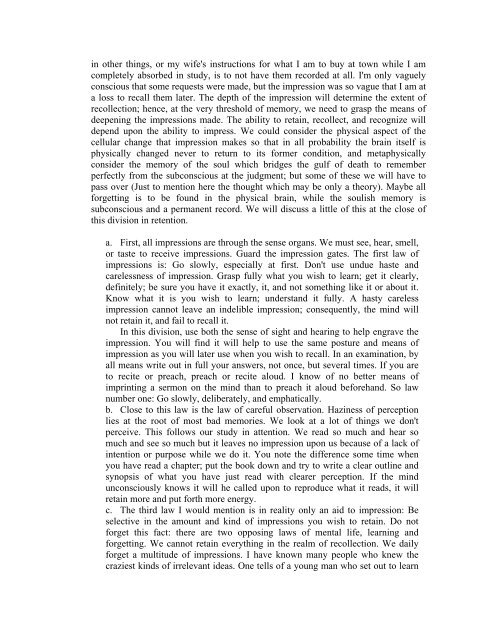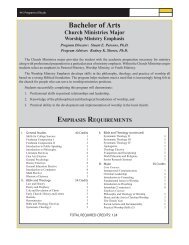CHRISTIAN PSYCHOLOGY DR. E. C. BRAGG - Trinity College
CHRISTIAN PSYCHOLOGY DR. E. C. BRAGG - Trinity College
CHRISTIAN PSYCHOLOGY DR. E. C. BRAGG - Trinity College
You also want an ePaper? Increase the reach of your titles
YUMPU automatically turns print PDFs into web optimized ePapers that Google loves.
in other things, or my wife's instructions for what I am to buy at town while I am<br />
completely absorbed in study, is to not have them recorded at all. I'm only vaguely<br />
conscious that some requests were made, but the impression was so vague that I am at<br />
a loss to recall them later. The depth of the impression will determine the extent of<br />
recollection; hence, at the very threshold of memory, we need to grasp the means of<br />
deepening the impressions made. The ability to retain, recollect, and recognize will<br />
depend upon the ability to impress. We could consider the physical aspect of the<br />
cellular change that impression makes so that in all probability the brain itself is<br />
physically changed never to return to its former condition, and metaphysically<br />
consider the memory of the soul which bridges the gulf of death to remember<br />
perfectly from the subconscious at the judgment; but some of these we will have to<br />
pass over (Just to mention here the thought which may be only a theory). Maybe all<br />
forgetting is to be found in the physical brain, while the soulish memory is<br />
subconscious and a permanent record. We will discuss a little of this at the close of<br />
this division in retention.<br />
a. First, all impressions are through the sense organs. We must see, hear, smell,<br />
or taste to receive impressions. Guard the impression gates. The first law of<br />
impressions is: Go slowly, especially at first. Don't use undue haste and<br />
carelessness of impression. Grasp fully what you wish to learn; get it clearly,<br />
definitely; be sure you have it exactly, it, and not something like it or about it.<br />
Know what it is you wish to learn; understand it fully. A hasty careless<br />
impression cannot leave an indelible impression; consequently, the mind will<br />
not retain it, and fail to recall it.<br />
In this division, use both the sense of sight and hearing to help engrave the<br />
impression. You will find it will help to use the same posture and means of<br />
impression as you will later use when you wish to recall. In an examination, by<br />
all means write out in full your answers, not once, but several times. If you are<br />
to recite or preach, preach or recite aloud. I know of no better means of<br />
imprinting a sermon on the mind than to preach it aloud beforehand. So law<br />
number one: Go slowly, deliberately, and emphatically.<br />
b. Close to this law is the law of careful observation. Haziness of perception<br />
lies at the root of most bad memories. We look at a lot of things we don't<br />
perceive. This follows our study in attention. We read so much and hear so<br />
much and see so much but it leaves no impression upon us because of a lack of<br />
intention or purpose while we do it. You note the difference some time when<br />
you have read a chapter; put the book down and try to write a clear outline and<br />
synopsis of what you have just read with clearer perception. If the mind<br />
unconsciously knows it will he called upon to reproduce what it reads, it will<br />
retain more and put forth more energy.<br />
c. The third law I would mention is in reality only an aid to impression: Be<br />
selective in the amount and kind of impressions you wish to retain. Do not<br />
forget this fact: there are two opposing laws of mental life, learning and<br />
forgetting. We cannot retain everything in the realm of recollection. We daily<br />
forget a multitude of impressions. I have known many people who knew the<br />
craziest kinds of irrelevant ideas. One tells of a young man who set out to learn

















